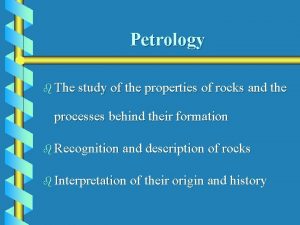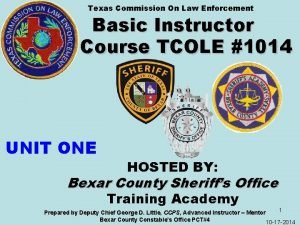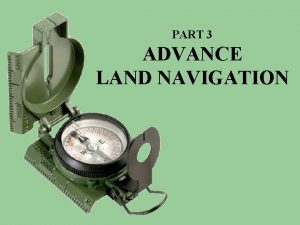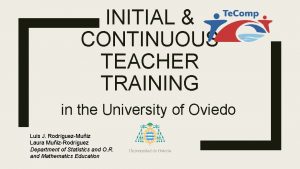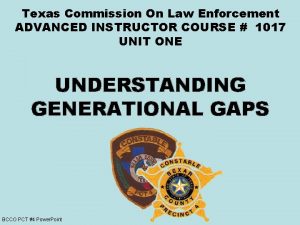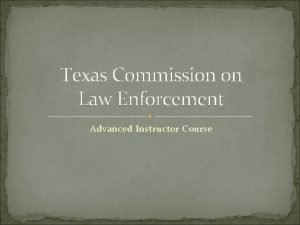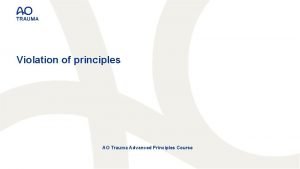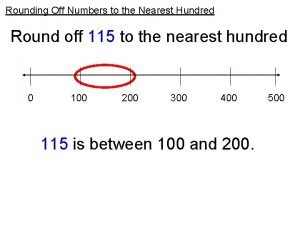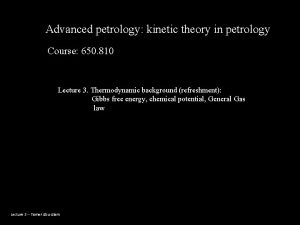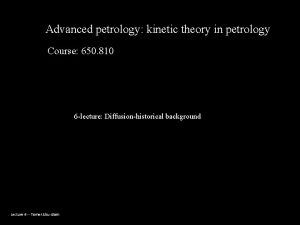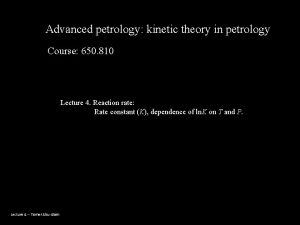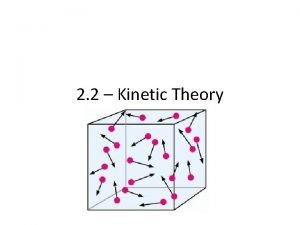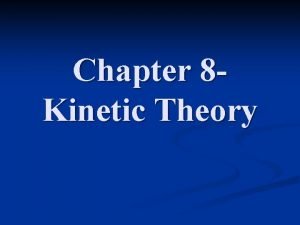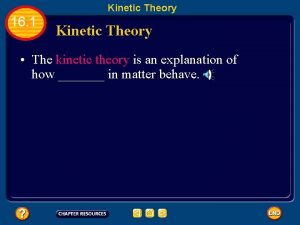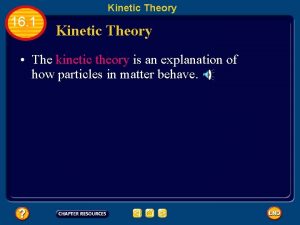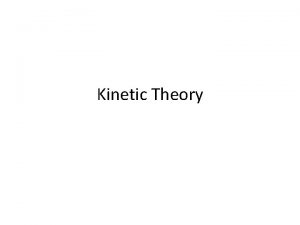Advanced petrology kinetic theory in petrology Course 650









- Slides: 9

Advanced petrology: kinetic theory in petrology Course: 650. 810 : 3 ECTS credits : 2 Semester hours : Continuous assessment Lecture 1 -- Tamer Abu-Alam


The course will give the basics of kinetic theory and their applications to geological problems. It covers the principles of kinetics from the atomistic treatment of reaction rates and potential energy surfaces to the megascopic treatment of the kinetics of geochemical cycles. The course stresses the close relationship between reaction kinetics and reaction mechanism and emphasizes the need to view earth science phenomena as “on-going” processes, that is, to add the element of time fully to the more traditional classification of the Earth in terms of chemical or physical signatures. The student will be introduced to the origin and interpretation of microstructures and chemical zonation. Kinetics of rock forming processes and the critical role of fluids will be central topics in lectures. Lecture 1 -- Tamer Abu-Alam

Lecture 1. Preparatory class to discuss the scheduled dates Lecture 2. Thermodynamic background (refreshment): First, second and third laws of thermodynamics (internal energy, entropy and enthalpy definitions). Lecture 3. Thermodynamic background (refreshment): Gibbs free energy and Chemical potential. Relations between P-T-V and n. Phase equilibria. Lecture 4. Reaction rate: Equilibrium constant (K), dependence of ln. K on T and P. Lecture 5. Transition state theory: Entropies of activation - relation between rates and ΔG – implication of transition state theory and ionic strength effects. Lecture 1 -- Tamer Abu-Alam

Lecture 6. Transport theory: Continuity equation, energy conservation, Darcy’s law, chemical reactions and transport. Lecture 7. Diffusion: Fick’s first law, diffusion coefficient, Fick’s second law. Lecture 8. Diffusion: Einstein equation, closure temperature, solution of the diffusion equation. Lecture 9. Nucleation theory: Nucleation in a simple phase transformation, nucleation in a multi-phase crystal assembly. Lecture 10. Crystal Growth and dissolution theory: Growth in a fluid environment, growth in a solid environment, Growth in multi-phase assembly. Lecture 11. Application: Time-dependent diffusion coefficient - Diffusion and timescale of metamorphism. Lecture 1 -- Tamer Abu-Alam

Lecture 12. Application: Mechanism of reaction andalusite – sillimanite and kyanite – sillimanite. Kinetics of garnet crystallization Lecture 13. Application: Corona microstructures, Exsolution kinetics (exsolution microstructures in alkali feldspar, calcite-dolomite intergrowths) Lecture 14. Application: Interfacial energy and changing of shape and size of crystals, crystal shape in medium- and high-grade metamorphic terranes. Lecture 15. Application: Open lecture for general discussion. One Lecture as a spare Lecture 1 -- Tamer Abu-Alam

What is the kinetic? ? Kinetic is the study of processes and as such it incorporates time into the study of Earth sciences. The time scales involved in our lectures will range from those describing molecular motion (10 -12 sec) to those relevant to plate tectonic dynamics (100 million years or 1015 sec) Within this time span lie a vast array of kinetic procesess (e. g. Molecular complexation, adsorption, surface reactions, fluid flow, diffusion, conduction, diagenesis, weathering, isotope exchange processes, oxidation, nucleation, growth, magma generation, geochemical cycle, mantle creep, subduction and erosion processes etc) Lecture 1 -- Tamer Abu-Alam

Why there are two lectures on thermodynamics? ? What is the system? ? System types - Open system - Close system - Isolate system The description of time-dependent phenomena (e. g. Kinetics) is even more akin to geology than thermodynamics (time independent) Water on top of a hill example Lecture 1 -- Tamer Abu-Alam

See you in Next lecture. Thermodynamic background (refreshment): First, second and third laws of thermodynamics (internal energy, entropy and enthalpy definitions). Lecture 1 -- Tamer Abu-Alam
